CIBA 2024: Immersing in Nature of Creativity on the New Stage of Alexandrinsky Theatre
On March 17, the New Stage of the Alexandrinsky Theatre hosted the conference about creative industries 'CIBA: Creative industries. Business. Art'. It is a joint project of the students of the Master's programme 'Arts and Culture Management' and the theatre. At the CIBA venue, experts discussed the topic of creative crises in the work of a creator.
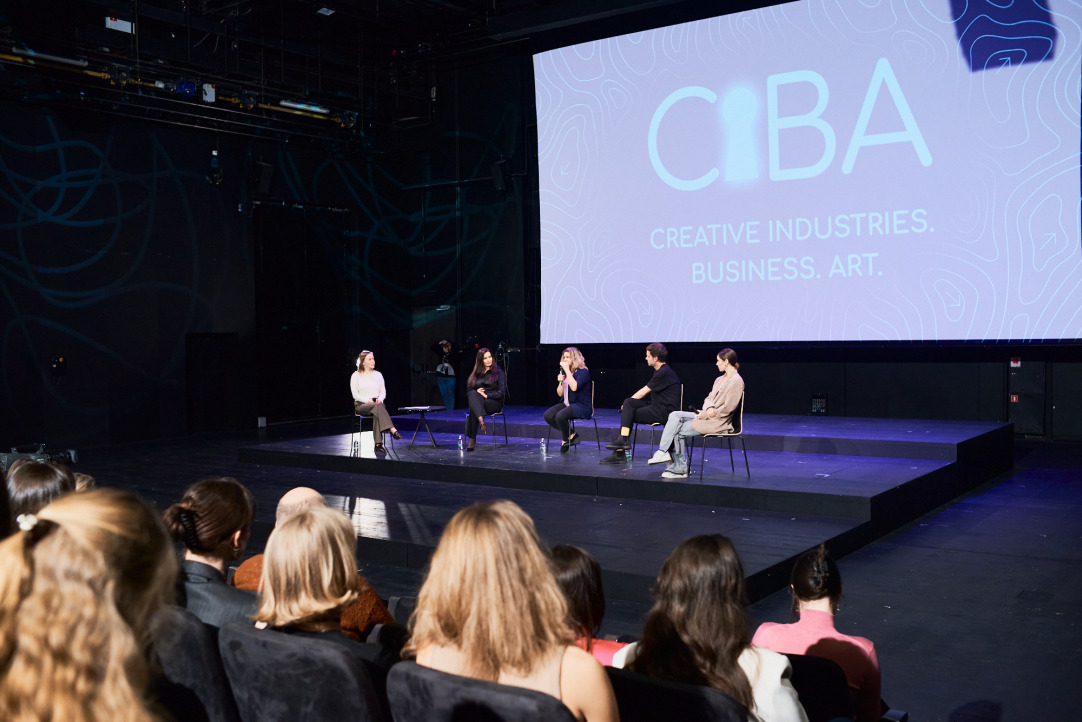
CIBA has been held on the New Stage of the Alexandrinsky Theatre for the fourth time thanks to the cooperation of the theatre and HSE University. The conference was organised by Master's students and professors of the programme 'Arts and Culture Management' together with the theatre employees. The mission of CIBA is to create a platform for a dialogue between the representatives of creative industries, business and art.
This year, the conference is devoted to the nature of creativity and creative crises. The highlight of the evening was a panel discussion. It started with the opening speech by Pavel Kuzmin, Deputy Director for Study Process and Digital Transformation. He underscored that students of HSE University-St Petersburg regularly participated in significant projects for the city, and CIBA was one of them.
Pavel Kuzmin, Deputy Director for Study Process and Digital Transformation
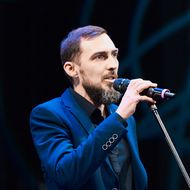
Today is a special day—we are at an event created by HSE students. It is always pleasant to see the results of our students' work outside the campus, especially in one of the main gathering points for creative art in the city—on the New Stage of the Alexandrinsky Theatre. By the way, the New Stage and HSE University-St Petersburg are very similar: we are just as young, bold, creative and not ready to stop. Of course, for us, it is a valuable collaboration. I wish further development for CIBA. Let us meet again next year on this amazing stage.
For the New Stage of the Alexandrinsky Theatre, the cooperation with the Master's students fits well into the general focus on collaborations. During the current theatre season, the New Stage has organised joint projects with cultural institutions of St Petersburg, Moscow, Perm and Suzdal.
Alexander Malich, Chief Producer of the New Stage of the Alexandrinsky Theatre

We are very happy that CIBA takes place on the New Stage of the Alexandrinsky Theatre. It is amazing that the conference is organised by young people, HSE students, together with our curators. This is the synergism, the power for which the New Stage exists—the word 'new' in the title shows it.
This year, CIBA is devoted to creative blocks in art and creative projects. For our young and enthusiastic team, a creative crisis is a natural process which we try to turn to our advantage. We treat a crisis without fear and with understanding as overcoming this crisis always entails a creative breakthrough. If something goes wrong in creative work, you can always say: 'This was the plan, it is an artistic device'. That's it, we go on.
The panel discussion gathered representatives of large companies, cultural institutions and creative agencies. The experts shared their experiences of overcoming obstacles in creative professions. One of the key practices which helps to get back your inspiration is the change of activities. However, it is hard to pause a creative process—it's a constant search for ideas and new meanings. This got the attention of Elizaveta Pavlycheva, Head of the exhibition department of the Central Exhibition Hall 'Manezh'. She also shared where the 'Manezh' employees get ideas for exhibition projects.
Elizaveta Pavlycheva, Head of the exhibition department of the Central Exhibition Hall 'Manezh'
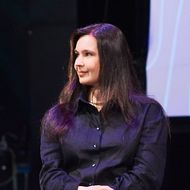
For a long time, the work in the museum has been a lifestyle and an activity which accompanies me every second. As a curator, I look for new information in the whole world around me and get new ideas from it to use in my own projects.
'Manezh' covers various topics at its exhibitions—from ballet to kinetic art, from Russian sculpture to early secular provincial portraits in the painting. For sure, it is impossible to be a narrowly focused specialist in all the spheres. From this perspective, we're very lucky: thanks to guest experts, our team constantly gets new creative ideas. Sometimes, artworks themselves offer new meanings. Entering into a dialogue with other exhibition objects, they start showing new colours and creating meanings which we couldn't even predict.
In the modern world, a source of inspiration can be not only the world around us but also artificial intelligence. Natalie Bredikhina, Head of the Copywriting Department at 'SETTERS', highlighted the efficiency of joint brainstorms. However, if there is no right person around, you can give this task to AI.
Sometimes creative blocks catch not only individual professionals but also teams in general. A way to wipe out a creative crisis is a proper distribution of roles. The task of a leader is to make a team of various professionals which consists not only of creators but also managers who know how to bring a creative idea to life. The participants heard about the experience in managing four teams at the same time from Eduard Fedorov, Project Producer of 'Taste Project by italy&co' and Creative Director at the agency 'park.ideas'.
Eduard Fedorov, Project Producer of 'Taste Project by italy&co' and Creative Director at the agency 'park.ideas'
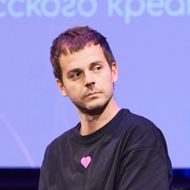
I work in four different teams. As a leader, I've always found it important to inspire my team. If a colleague gets tired, I realise that it is better to postpone all the tasks and engage in something that can help to disclose the creative spirit of the team without distracting from the work processes too much. For instance, in the project 'Taste Project', we usually attend new exhibitions or plays together. In the same cases, the agency 'park.ideas' holds strategic sessions which help to develop the teams' creative ideas.
It's the fourth time I have participated in CIBA as a listener and on behalf of the partner 'italy&co'. I used to invite speakers from our team but this year, I have become one myself. Just like in previous years, I have amazing impressions of the conference. I see how the project is growing and developing. For me, the most important thing is that the students are involved in the project. I am always thrilled when young people do what they are truly interested in. It gives me energy as well.
There can be different reasons for creative blocks, and one of them is the peculiarities of human brain structure. Maria Starchenko, Candidate of Psychological Sciences and Doctor of Biological Sciences, told the attendees about the creative process in terms of physiology. It turned out that our brain perceives creativity as routine if we do it every day. To avoid it, it is useful to practice cognitive skills related to creativity: attention span and imagination.
Apart from open discussions, the CIBA participants were offered a dance workshop, art therapy and a workshop in communications. The representatives of 'Upsala Circus' described what methods of circus education help to establish communication not only in social projects but also in business. Together with project trainers, the guests learnt to juggle and practice in pairs the rhythmic exercises for developing cognitive skills.
Sergey Mashukov, Fund-Raiser at 'Upsala Circus'
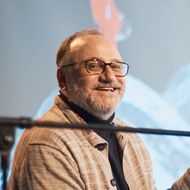
The way of communication that we offer is based on the method of circus education. It is universal for both social and corporate tasks though it might seem strange. When a company is at a crossroads or goes through turbulent periods, the circus helps to cheer up and unite the team.
In the circus, we believe that each person is talented and that making mistakes is okay. Why does such an approach work? Because all of us are children who fell asleep, the circus takes us back to the roots and helps to assess what is going on in a new way. A basic example is that juggling turns on the left and right hemispheres of the brain activating cognitive skills. So it's time to try the circus!
The value of CIBA is growing in the professional art and business community. From year to year, the conference is becoming a point of attraction for representatives of creative industries not only on the stage but also in the hall. This year, the conference was attended by more than 150 people. The participants of the conference received certificates which would give extra points for admission to the Master's programme 'Arts and Culture Management'.
Anton Gorky, Conference Guest
I have my own studio where we hold open events for developing a community of brands based on creative clusters. I sincerely love such events as CIBA where you can meet like-minded people.
The final discussion is steady and sincere. An option of a reset, which Eduard mentioned, with turning off not only your phone but also your watch surprised me with its easiness—we are so used to the time that we forget that we can remove it. Such dialogues—lively and honest—always inspire.
In 2024, the Master's programme 'Arts and Culture Management' offers international applicants state-funded and fee-paying places. Detailed information about admissions is available on the programme webpage and in the section for the prospective master's students of HSE University-St Petersburg.

